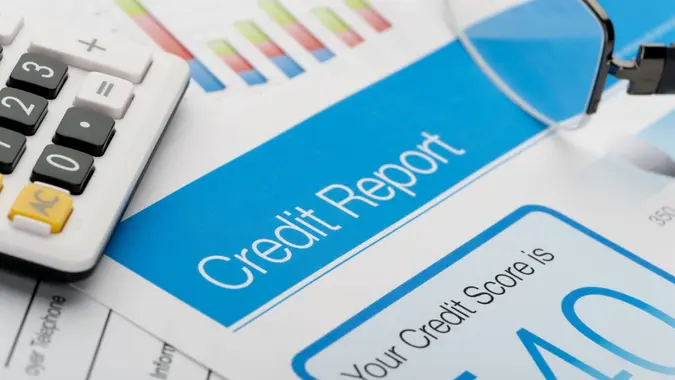6 Fastest Ways To Boost Your Credit Score If You Need a Loan This Year

Commitment to Our Readers
GOBankingRates' editorial team is committed to bringing you unbiased reviews and information. We use data-driven methodologies to evaluate financial products and services - our reviews and ratings are not influenced by advertisers. You can read more about our editorial guidelines and our products and services review methodology.

20 Years
Helping You Live Richer

Reviewed
by Experts

Trusted by
Millions of Readers
According to Experian, a credit score that’s less than 670 falls below what is considered “good.” And it can make it more expensive to borrow money or cause lenders to deny your loan application — neither of which is ideal.
The good news is there are ways to boost your credit score, and you may not have to wait years to see results.
Here are some fast, expert-approved ways to boost your credit score if you’re looking to get a loan this year.
Reduce Your Credit Utilization Rate
Gwyneth Borden, co-founder and CEO of Remynt, said that to quickly improve your credit score, focus on managing your credit utilization rate — the total amount of credit card debt you owe compared with your total credit limit across all your cards.
“Keeping this rate under 30% is key because higher utilization can negatively impact your score,” she explained. “If your utilization exceeds this threshold, prioritize paying down your balances to bring it below 30%. Once you achieve this target, then take out your loan. The credit score is only a snapshot of your credit file, so if your utilization rate exceeds 30% after the loan is approved, it won’t factor into the approval process.”
Check Your Credit Report for Errors
“Any errors, regardless of how minor — such as incorrect balances or a late payment not properly reported — will lower your score,” said Michael Baynes, co-founder and CEO of Clarify Capital. “Disputing errors sooner minimizes the possibility of their causing issues when obtaining credit in the future.”
If you find errors on any of your reports, you’ll need to dispute the errors with the relevant credit bureau online or by mail or phone.
Make Timely Payments
“This is one of the most significant factors in payments reported to credit bureaus, and late payments can significantly impact your credit score,” Borden said.
Unfortunately, a late payment can affect your credit score by up to 100 points, according to Capital One. Plus, it can stay on your credit report for seven years, per Equifax.
Make a Goodwill Adjustment Request If Needed
Baynes said that if you’ve made the occasional late payment, catching back up and requesting a goodwill adjustment with the lender can be beneficial. “Most lenders, especially the ones with whom the client enjoys good standing, will drop a late payment upon request,” he said.
If you choose to write a goodwill adjustment letter, it should acknowledge that you made a late payment and explain why. Also, mention your past efforts to make payments on time and politely make your request that the late payment be removed. The lender may or may not approve your request, but it doesn’t hurt to try.
Consolidate Debt
Baynes said that another beneficial approach for boosting your credit score is debt consolidation.
“If you have several high-interest accounts, rolling them into one loan with superior terms will decrease your utilization and ease the payment process, resulting in a credit score increase,” he explained.
Become an Authorized User on Someone Else’s Card
According to Borden, another option is to ask to be added as an authorized user on someone else’s credit card. Typically, this would be a responsible family member or good friend.
Because their payment history will appear on your credit report, make sure they have good credit and a solid payment record. Additionally, according to Experian, it’s important to make sure that the card you’ll be added to as an authorized user is one that reports to the three major credit bureaus. Otherwise, it won’t do you any good.
It may take a month or two for the account to appear on your credit reports, at which point the payment history and account age will factor into your score.
 Written by
Written by  Edited by
Edited by 
























